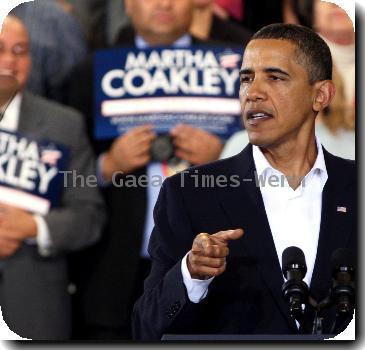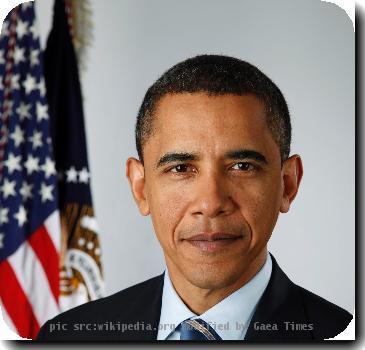White House: Expect slow jobs rebound even as economy shows signs of reversing downward spiral
By Steven R. Hurst, APSunday, April 4, 2010
White House braces unemployed for slow job rebound
WASHINGTON — Buoyed by good news on the jobs front, the White House claimed credit Sunday for reversing the downward economic spiral while bracing out-of-work Americans for a slow recovery.
The Obama administration also eased away from confrontation with China over its artificially low currency. The U.S. wants to encourage Beijing’s help on nuclear proliferation and new penalties against Iran for its perceived attempts to build a bomb.
Given the depth and length of the recession, the White House wants to cool expectations of a rapid economic recovery before the November elections that will determine whether Democrats retain control of the House and Senate.
The administration’s line is that there’s steady, if slow, progress in repairing the economic ruin President Barack Obama repeatedly blames on his predecessor, Republican George W. Bush.
The economy added about 162,000 jobs in March, the most in nearly three years. A large percentage of the gains were temporary census workers hired by the federal government, and the unemployment rate held firm at 9.7 percent. The additional 123,000 private-sector jobs were the most since May 2007.
The economy is growing again, but at a pace unlikely to quickly replace the 8.4 million jobs erased in the recession that began in late 2007. More than 11 million people are drawing unemployment insurance benefits.
“We’ve got a long way to go,” said Lawrence Summers, director of the National Economic Council. “We’ve inherited a terrible situation, the most pressing economic problems since the Great Depression in our country.”
Christina Romer, head of the White House Council of Economic Advisers, said consumers still face “a lot of head winds” from the financial crisis. For example, debt and credit difficulties are hampering stronger job growth.
They were echoing the words of Treasury Secretary Timothy Geithner, who said last week the administration was “very worried” about returning to a more normal jobless rate of around 5 percent.
Summers said Obama was preoccupied with creating jobs. “The trend has turned, but to get back to the surface, we’ve got a long way to go,” Summers said.
As Obama moves on with his legislative agenda after victory on health care, Summers said he believed Congress would pass new oversight rules for the financial industry. The Wall Street meltdown was largely blamed for the recession and the near collapse of the global financial system.
“I expect that reform is going to pass,” Summers said. Obama wants it on his desk within two weeks.
Arizona Sen. John Kyl, the No. 2 Senate GOP leader, accused Democrats of pulling out of bipartisan negotiations on the bill. Nonetheless, he said he thought there was “a substantial opportunity” for a bipartisan solution.
On the issue of Chinese currency manipulation, Summers denied that a delayed report to Congress amounted to a trade-off for Beijing’s support for new penalties against Iran.
The report was due April 15 — just as China’s president comes to Washington for a nuclear security summit. Geithner said Saturday it would come out after several high-level international meetings in the months ahead, when Washington would have the opportunity to continue pushing its position.
China keeps the value of its currency at an artificially low level, making its goods less expensive in the U.S. market and causing American exports to be too expensive for Chinese consumers. They result is an exploding U.S. trade deficit
The White House is pressing China and Russia, which normally oppose Iranian sanctions, to join the effort to punish Tehran. Iran is enriching uranium in violation of international agreements against nuclear proliferation; the Iranian government says its nuclear ambitions are limited to developing nuclear power for peaceful purposes.
The West, led by the United States, contends Iran is trying to build a nuclear bomb, an outcome that Washington contends would launch an arms race in the Middle East.
As China began showing a readiness to join discussions on punishing Iran and President Hu Jintao committed to participating in Obama’s nuclear proliferation conference this month, the administration eased back on the threat to label China as a currency manipulator and the imposition of trade restrictions.
Even as the report was delayed, Romer acknowledged the currency issue remained important.
“We think it (the value of the yuan) needs to be more influenced by market forces,” she said. “I think there’s no question of that. … We’re going to be working to, to get the kind of result that we want, which is something more in alignment.”
Summers spoke on ABC’s “This Week” and CNN’s “State of the Union.” Romer appeared on NBC’s “Meet the Press,” and Kyl was on “Fox News Sunday.”
Tags: Asia, Barack Obama, Beijing, China, District Of Columbia, East Asia, Greater China, Hu Jintao, Iran, Labor Economy, Middle East, North America, Political Issues, Recessions And Depressions, Tv News, United States, Us-economy, Washington, Weapons Administration




